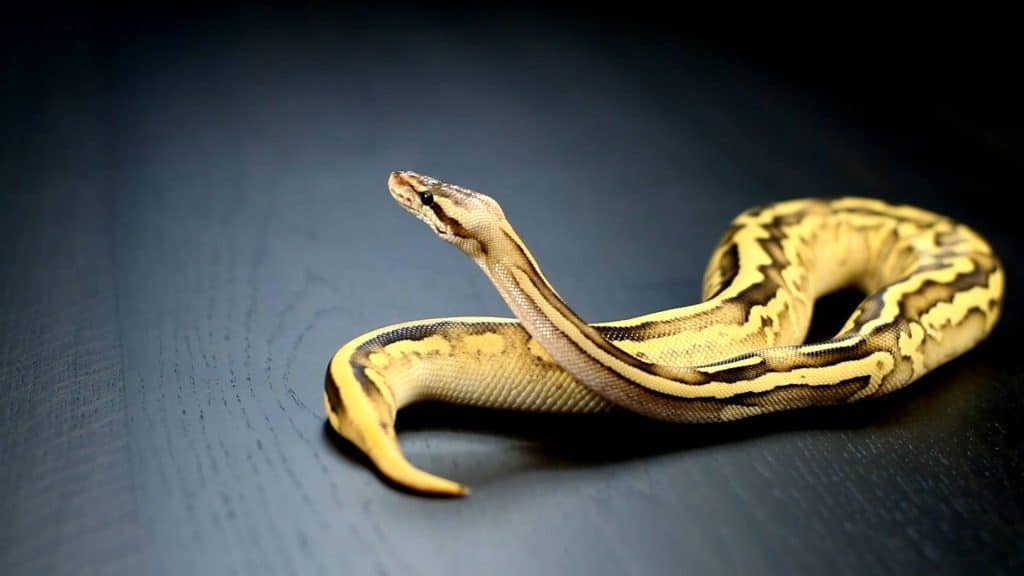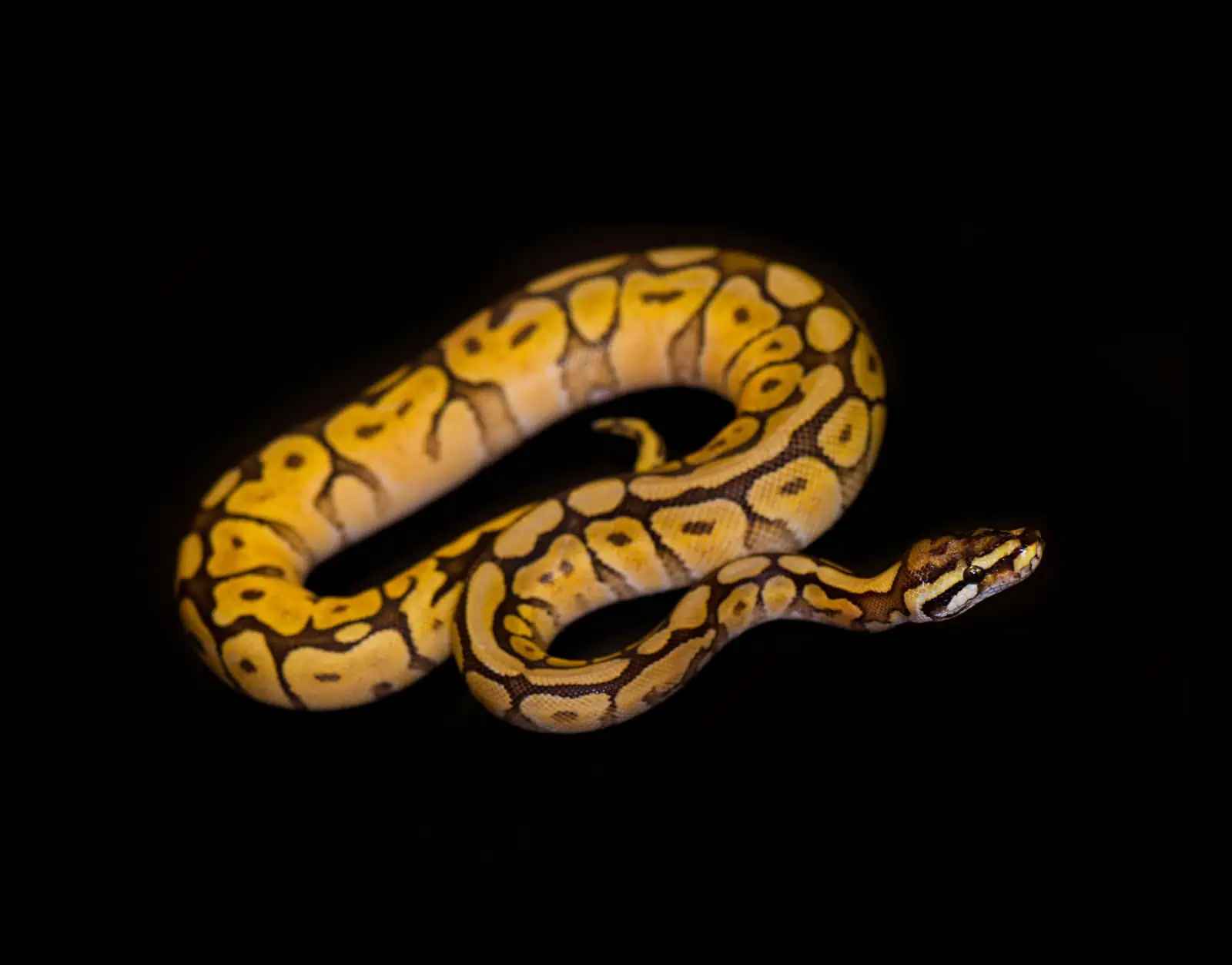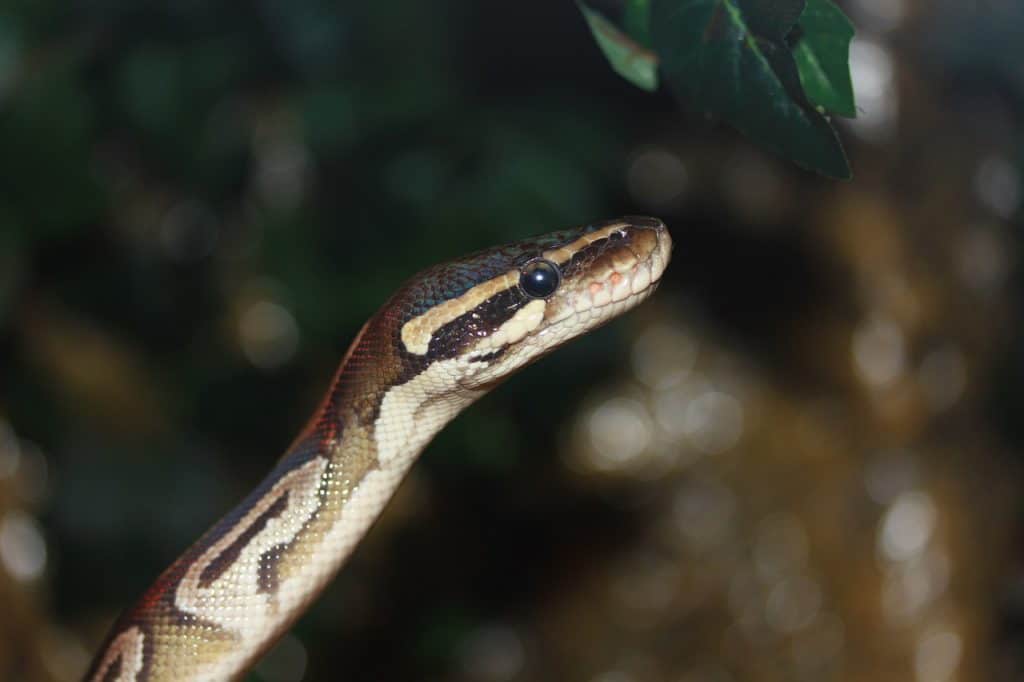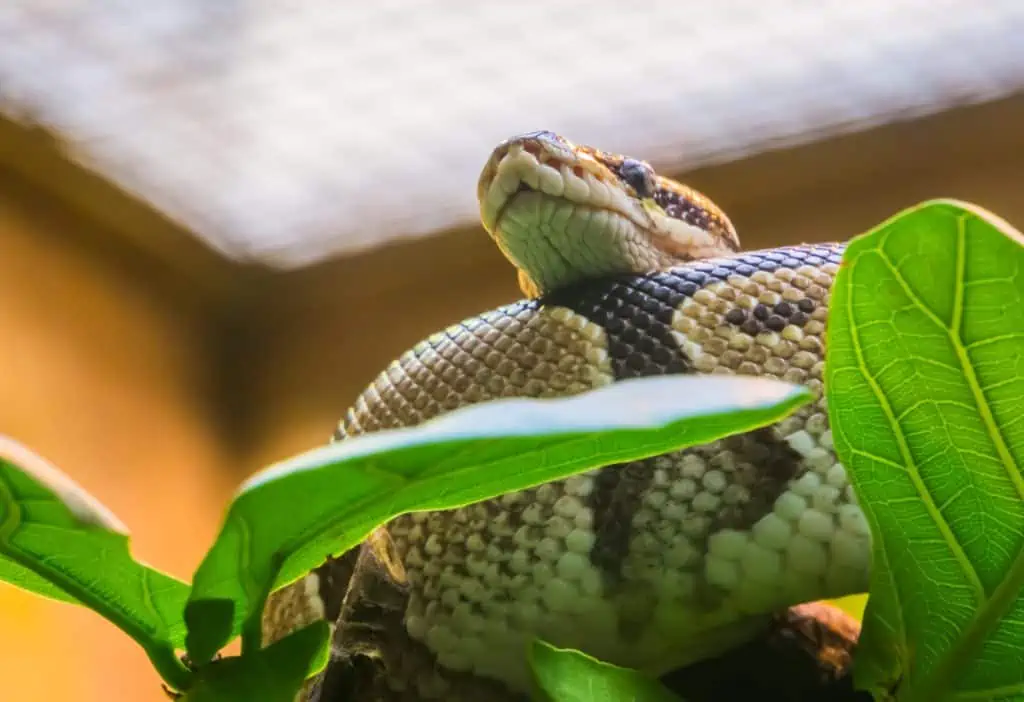Stargazing is a mysterious and rare phenomenon in ball pythons, but it can be very concerning to owners. It is a neurological disorder that causes your snake lifts its head into the air and looks directly up or towards the side of its enclosure while keeping its body motionless.
This strange behavior may last for several minutes before returning to normal activities. Although stargazing isn’t a disorder itself, it can be indicative of various diseases, including Inclusion Body Disease (a viral infection affecting boas and pythons) along with other causes such as:
- Neonatal tremors
- Major organ dysfunction
- Extreme temperature fluctuation
- Viral, bacterial, or septic infection
- Traumatic injury
- Toxic exposure
- Dehydration
- Hypocalcemia
Fortunately, treatments are available to help manage the symptoms and improve your snake’s quality of life.
We will examine the various causes of ball python stargazing and provide insight into symptoms, diagnosis, and potential treatments.
What Is Ball Python Stargazing?
Stargazing in ball pythons is a neurological condition where the muscles of their neck and head contract, causing them to rise up. It looks as if they are admiring the stars – hence its name! While it may appear harmless enough or be mistaken for periscoping (an exploratory behavior), this signifies something more serious, and in some cases, the python may even become unresponsive and enter a state of paralysis.
Why Is My Ball Python Stargazing?
There are many explanations for why your ball python may be stargazing. It’s important to remember that this behavior is only a symptom, not an illness. Here I’ve highlighted the most typical factors behind stargazing.
Extreme Temperature Fluctuations
Another common cause of stargazing is exposure to extreme temperatures. Ball pythons need a specific temperature range to stay healthy, and if they experience temperatures that are too hot or too cold, you may find them stargazing.
I urge ball python owners to ensure their pet’s enclosure maintains optimal temperatures by monitoring with thermometers and adjusting accordingly.
Neonatal Tremors
Neonatal tremors are common in ball pythons, especially those that have just hatched or are newly born. These tremors can often look like stargazing, but they will generally go away on their own as the snake matures and its body develops.
If you notice your ball python exhibiting this behavior, keep a close eye on it and make sure it is eating and growing normally.
Inclusion Body Disease (IBD)
This is a highly contagious disease that attacks the neurological, gastrointestinal, and respiratory systems of pythons. It can cause muscle twitches and spasms, which may lead to stargazing.
Major Organ Dysfunction
Stargazing in ball pythons is largely triggered by a failure of major organs, such as the lungs, kidneys, or liver. When these parts do not function properly, it can cause neurological and behavioral issues, often resulting in this behavior.
Viral Infections
Viral ailments such as paramyxovirus can severely affect snakes’ neurological and respiratory systems, leading to breathing problems and cause significant discomfort, leading to behavioral changes such as stargazing.
Septic Infections
If your ball python has a septic infection, such as a bacterial or fungal infection, that penetrates the central nervous system by crossing the blood-brain barrier, it can cause neurological symptoms like stargazing.
Bacterial Infections
Acanthamoeba meningoencephalitis is one of the most common bacterial infections known to cause stargazing in ball pythons. This is due to the bacteria causing inflammation of the brain & spinal cord, leading to neurological damage.
Traumatic Injury
When a ball python has suffered a traumatic injury to the brain or spinal cord, it can often exhibit behavior that is similar to stargazing. Trauma is often due to inadequate enclosure setup or handling, something falling on the snake or a bite from another animal. This can also happen when they are startled or scared by something sudden and unexpected, like a loud noise or sudden movement.
Toxic Exposure
Exposure to hazardous substances found in pest strips, cleaning products, mite sprays, and beyond can result in neurological complications that may contribute to the emergence of stargazing behavior in your ball python.
Hypocalcemia
It is a calcium deficiency in the snake’s body and can be caused by inadequate nutrition or another underlying health issue. This condition can cause increased muscle twitches, spasms, tremors, and seizures – all of which could lead to stargazing behavior.
Dehydration
If your ball python becomes dehydrated due to a lack of water or inadequate humidity levels in their enclosure, it can be a factor behind stargazing. Dehydration can lead to electrolyte imbalances and other health issues that can contribute to neurological symptoms like stargazing.
How Do I Know if My Snake Is Stargazing?
Stargazing should not be confused with periscoping, as they look similar but serve different purposes. Periscoping happens in short bursts and is more focused on exploration, while stargazing is a relaxed activity and typically lasts for much longer periods of time.
To differentiate between stargazing and periscoping; you need only place your python on its back; If it cannot turn itself over again, then it’s likely that what you’re seeing isn’t exploration but rather stargazing.
Furthermore, if you notice your ball python lifting its head and neck for over 10 seconds and up to several hours at once and doing this in a relaxed state and not moving around, then this is a good sign that your snake is stargazing, other signs include:”
- Disorientation
- Difficulty with mobility
- Seizures
- Lethargy
- Skin disorders
- Weight loss
- Depression
- Vomiting
Alarmingly, ball pythons can suffer from neurological issues precipitously, and the other signs may not be readily visible when stargazing.
Detection of Stargazing Syndrome in Ball Pythons
If you fear your snake is experiencing stargazing syndrome, I advise you to book an appointment with a veterinarian. Diagnosing the condition requires careful observation of body, head, and neck positioning – it’s quite a straightforward affair for an expert.
Your vet may want to take more time than usual during their visit to ensure that they get an accurate diagnosis; once confirmed, they’ll investigate what might be causing this behavior in your serpent friend.
To identify the root cause of this syndrome, he may need to undertake multiple tests. Prior to commencing with testing procedures, he will ask you different questions like:
- Any additional signs and symptoms,
- Lifestyle choices,
- Behaviors that have shifted recently,
- Diet habits, as well as other relevant topics
After that, your veterinarian will assess the overall health of your reptile with a comprehensive physical exam. This could include:
- Blood test
- Fecal matter test
- Urine test
- X-rays
- Tissue biopsies
Through these diagnostic tests, your veterinarian will gain a more accurate understanding of the root cause behind his stargazing.
Cure of Stargazing Syndrome in Ball Pythons
Identifying the root cause of stargazing in snakes is essential to providing effective treatment. After a diagnosis has been made, your snake could be eligible for any one of numerous therapeutic methods designed specifically for each particular condition they may have, such as:
Injury
If your snake has suffered a severe injury, your veterinarian will be able to treat it quickly. However, if he is displaying signs of stargazing due to an earlier trauma that perhaps wasn’t treated correctly in the first place, they can devise a plan for him to continue his rehabilitation.
Infections
When your reptilian friend has a bacterial, fungal, viral, or parasitic infection, the veterinarian will give you steps to treat it. Depending on which type of malady they have contracted, antibiotics, antifungals, and antiparasitics can be prescribed in the form of topical treatments, injections, or pills.
With this combination care plan tailored to their needs and symptoms – your beloved snake can get back to slithering quickly!
Exposure to Toxins
If the stargazing syndrome is caused by exposure to toxins, your vet will work with you to identify and remove the source of the toxin. This process can involve environmental clean-up, chemical analysis, or both.
Once the source has been successfully eliminated, you should see an improvement in your snake’s symptoms.
Nutritional Deficiencies
If your ball python is deficient in certain essential vitamins and minerals, the vet can recommend a diet that specifically addresses its particular nutritional requirements.
This may involve adding more nutritious foods to their diet or supplementing with vitamin/mineral-rich supplements. With proper nutrition, your pet will be on the path to recovery in no time!
Stress
In case stargazing syndrome is caused by stress due to over-handling or any traumatic event. The vet may suggest reducing the number of times you handle your pet or providing more hiding spots in their enclosure, and increasing enrichment activities to reduce anxiety. With fewer stressors and more comfort, your snake should begin to feel better soon.
Temperature
In the event of temperature shifts that can lead to stargazing, your vet may suggest you maintain a comfortable atmosphere for your pet by giving them both warm and cool areas in their enclosure.
This way, they can move around freely to regulate their body temperature. Moreover, having a steady environment will make it easier for them to feel secure and safe, furthermore reducing any possibility of stargazing from taking place.

Recovery From Stargazing Syndrome
Healing from stargazing requires treating the underlying condition. You and your veterinarian are a team, so it is critical that you stay in communication with each other to ensure the best possible outcome for your snake. Your vet will be able to provide an accurate assessment of their health as well as explain any underlying concerns they have.
To ensure that your snake recovers from his condition, it is essential to provide him with the appropriate supportive care both at home and through consultation with your veterinarian. And if you are ever worried about something new occurring, don’t hesitate to reach out—your vet’s door is always open!
However, if your pet is inflicted with inclusion body disease, it will be a permanent condition. Your vet can assess the severity of symptoms and advise you on whether euthanasia may be necessary to end their suffering humanely.
Final Thoughts
The Ball Python Stargazing is a condition that can cause distress to both the pet owner and their beloved pet. Stargazing in ball pythons can be treated with the right knowledge and care. Pay attention to the signs of stargazing and intervene as soon as possible with proper husbandry conditions, nutrition, hydration, and rest.
If the underlying cause remains unknown or difficult to treat, discuss it with your veterinarian to find the best solutions for your pet. However, in some cases, this condition may not be able to be reversed, but it is still possible to manage the symptoms.
Have your pet suffered from stargazing? What was the underlying cause, and how did you confront the situation? We would love to hear your thoughts in the comments below!




